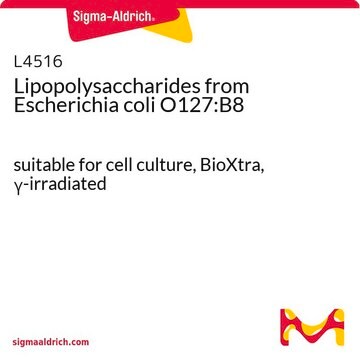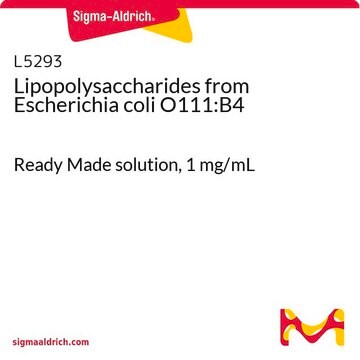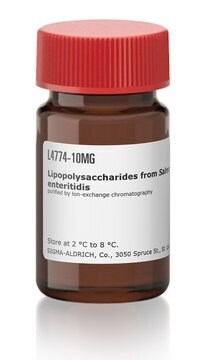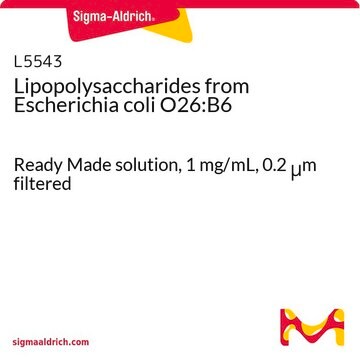おすすめの製品
由来生物
Salmonella enterica (Serotype minnesota)
無菌性
γ-irradiated
製品種目
BioXtra
形状
lyophilized powder
精製方法
gel-filtration chromatography
テクニック
cell culture | mammalian: suitable
不純物
<1% Protein (Lowry)
保管温度
2-8°C
類似した製品をお探しですか? 訪問 製品比較ガイド
詳細
リポポリサッカライド(LPS)は、グラム陰性菌の細胞壁を特徴とする構成成分です。LPSとその脂質A部分は、一般的な病原体関連分子パターン(PAMP)を認識するトール様受容体タンパク質ファミリーのメンバーであるトール様受容体4(TLR4)によって、自然免疫系の細胞を刺激します。
アプリケーション
Lipopolysaccharides from Salmonella enterica serotype Minnesota are used in cell culture and cell binding applications. LPS was used to elicit the activation of NF-κB pathway in human intestinal epithelial cells and mouse dendritic cells. It was used to study the immune responses following autologous blood donation.
生物化学的/生理学的作用
Lipopolysaccharides (LPSs) are characteristic components of the cell wall of Gram-negative bacteria. LPS and its lipid A moiety stimulate cells of the innate immune system by the Toll-like receptor 4 (TLR4), a member of the Toll-like receptor protein family, which recognizes common pathogen-associated molecular-patterns (PAMPs).
その他情報
To gain a comprehensive understanding of our extensive range of Lipopolysaccharides for your research, we encourage you to visit our Carbohydrates Category page.
関連製品
製品番号
詳細
価格
保管分類コード
13 - Non Combustible Solids
WGK
WGK 3
引火点(°F)
Not applicable
引火点(℃)
Not applicable
個人用保護具 (PPE)
Eyeshields, Gloves, type N95 (US)
適用法令
試験研究用途を考慮した関連法令を主に挙げております。化学物質以外については、一部の情報のみ提供しています。 製品を安全かつ合法的に使用することは、使用者の義務です。最新情報により修正される場合があります。WEBの反映には時間を要することがあるため、適宜SDSをご参照ください。
Jan Code
L4641-VAR:
L4641-1MG-PW:
L4641-1MG:
L4641-BULK:
試験成績書(COA)
製品のロット番号・バッチ番号を入力して、試験成績書(COA) を検索できます。ロット番号・バッチ番号は、製品ラベルに「Lot」または「Batch」に続いて記載されています。
この製品を見ている人はこちらもチェック
Zsolt Czimmerer et al.
Immunity, 48(1), 75-90 (2018-01-19)
The molecular basis of signal-dependent transcriptional activation has been extensively studied in macrophage polarization, but our understanding remains limited regarding the molecular determinants of repression. Here we show that IL-4-activated STAT6 transcription factor is required for the direct transcriptional repression
R Karger et al.
Transfusion medicine (Oxford, England), 17(1), 45-53 (2007-02-03)
Preoperative autologous blood donation (PABD) has been shown to decrease natural killer (NK) cell function in cancer patients, raising concerns about an increased cancer recurrence risk owing to PABD. It is unclear whether PABD leads to other immunomodulatory effects that
Sumit Bhattacharyya et al.
American journal of physiology. Gastrointestinal and liver physiology, 293(2), G429-G437 (2007-06-02)
Lipopolysaccharide (LPS) is recognized as an inducer of the inflammatory response associated with gram-negative sepsis and systemic inflammatory response syndrome. LPS induction proceeds through Toll-like receptor (TLR) in immune cells and intestinal epithelial cells (IEC). This report presents the first
Kendra Speirs et al.
Journal of immunology (Baltimore, Md. : 1950), 172(2), 752-756 (2004-01-07)
RelB, a member of the NF-kappaB family of transcription factors, is essential for dendritic cell (DC) maturation. Recent findings indicate that RelB is exclusively regulated through its interaction with cytoplasmic NF-kappaB2/p100. The studies presented in this report show that DCs
Michele Ferrara et al.
Frontiers in immunology, 11, 1122-1122 (2020-07-17)
Acute inflammation is a complex biological response of tissues to harmful stimuli, such as pathogens or cell damage, and is essential for immune defense and proper healing. However, unresolved inflammation can lead to chronic disorders, including cancer and fibrosis. The
ライフサイエンス、有機合成、材料科学、クロマトグラフィー、分析など、あらゆる分野の研究に経験のあるメンバーがおります。.
製品に関するお問い合わせはこちら(テクニカルサービス)





